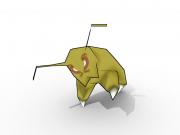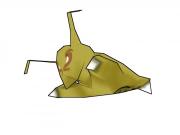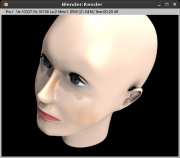While in Japan this past month, I met with both D.K. and Junpei Isshiki at a bar outside of Shin-okubo station. It was fantastic, as we talked for well over four hours, and even though Japanese is a second language for me we understood each other fairly easily just because of the strong similarity in interests. It’s not every day I can get into the nitty-gritty technical details of game development without extensive background explanation. And on a completely unrelated note, Isshiki could drink and smoke like nothing I’ve ever seen, downing an unholy amount of beer and cigarettes before the night was out, and he honestly didn’t look any worse the wear for it.
While our conversation rambled all over the place, touching on everything from a comparison of differences in coding older cartridge based systems (which allowed for the addition of expansion chips to extend upon the base capabilities of the host console) and modern consoles to shopping for old computer parts in Akihabara, there was one topic in particular that I thought deserved a write-up, and which the three of us spent a considerable amount of time discussing. That topic is accessibility. Both D.K. and Isshiki want a greater non-Japanese audience for their games, and they asked me to help them spread their games to more people. I doubt they are alone. Here are some of the ideas we bounced around, and some of my own mixed in as well.
On my own, I have spent a lot of time thinking about the topic of accessibility in terms of internationality lately, largely due to all of the Japanese freeware games I have been sorting through on the off-chance of finding something appropriate to write about at indiegames.com. When I first started sifting games for Tim, I didn’t think it would be a particularly difficult project. I speak fairly good Japanese, and so I naively thought that by reading the Japanese freeware news sites that I could find all kinds of cool games that would be extremely difficult to find by people who don’t speak the language. And I do find awesome games, a very great many of them, but almost all of them are unplayable outside of Japan for two reason. First, most of them have extremely Japanese-heavy interfaces, which prevents even the simplest of action games from being playable by non-Japanese speakers. The second, and more complicated issues are technical. A very great many Japanese games do not run on English-language based versions of Windows, crashing and burning when their filenames become garbled from the character-set change, or when libraries common on Japanese systems are either missing or outdated on Latin-alphabet based operating systems.
There are other small problems as well, such as garbage displaying on window title bars, and even the text inside games being displayed as random symbols instead of actual text. Even though most non-Japanese gamers will not be able to read the text even if it were being displayed correctly, I think displaying garbage causes damage to a game’s perception. What would otherwise be seen as a spotless release will seem more poorly put together as soon as one starts seeing text display as “@##$%!!@#$ }{_^*??!” instead of “あ!なにをやってんだろ??!”.
Certain developers, such as Zun (of Touhou fame), D.K., and Isshiki manage to skirt most of these problems with only a small amount of extra effort, but the bulk of developers do not. D.K.-san has been especially sensitive to this topic, attempting to make his games as universally accessible as is humanly possible.
However, even if a game is made with the intention of international release, it is often unknown outside of it’s host language due to a simple problem of logistics. How to non-native speakers of a game’s language even . This is the bulk of the reason why I try to find games for indiegames, searching for ways to connect Japanese and Western developers in ways that allow their games to be seen by more people. But, that is such a small part of the puzzle. I wonder about how many Chinese, how many Korean, how many Dutch or Russian games are missed by the world at large due to language and cultural barriers. I’m sure there must be indie gamers/developers out there who are bilingual in many languages, and who could bring all kinds of amazing games to the attention of the English-speaking world, and vice versa. The indie game scene is only as strong as it is visible, and more visibility will, I think, yield more and higher quality games, partially due to quantity, and partially due to the fact that I suspect most devs (I know it’s true for me) work harder, faster, and better when we know people are watching, waiting for, and enjoying what we produce.
Obviously, not all games are going to do well with international release. RPGs are obviously not good candidates, but even some of those would probably be worth translating. Just think of how many people would have missed out on Cave Story if not for the intrepid soul that translated it.
So, this is a call to do your part! Adopt a developer in another country! If you enjoy indie games and find a game in a language that would be difficult to understand for someone who does not speak the game’s language, provide an explanation of the rules, translate a readme, suggest it to a review site, or even just to a friend. Let developers know when a game doesn’t work on your computer. If you’re technically minded, try to help them fix the problem. And no matter what, send the developer a note, let them know personally when you suggest their games to a review site, or even if you just enjoyed it yourself. Nothing will make their day faster than knowing that somebody is enjoying their game.
Note: D.K. is a Pachinko programmer for Climax, and Isshiki codes arcade games for Milestone. I know this doesn’t really have much to do with the subject above, but I’m always curious about what other developers do for a living, so I’m throwing it out there :).










